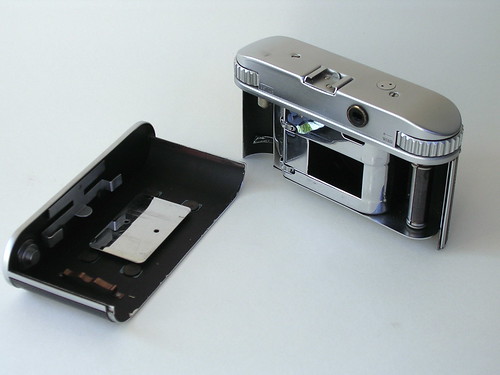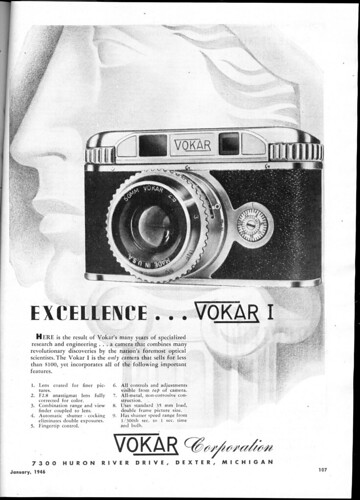Difference between revisions of "Vokar I"
m (wiki link back to company page) |
(claimed cost of developing, noted mid-1946 vanishing) |
||
| Line 10: | Line 10: | ||
{{stub}} | {{stub}} | ||
| − | The '''Vokar I''' camera had been designed by Richard Bills before WWII<ref>''Glass, brass, & chrome: the American 35mm miniature camera'' | + | The '''Vokar I''' camera had been designed by Richard Bills before WWII<ref> Lahue, Kalton C. and Bailey, Joseph A. ''Glass, brass, & chrome: the American 35mm miniature camera''; University of Oklahoma Press, 2001. pgs. 284-285</ref>, and allegedly the Electronic Products Manufacturing Co. invested $250,000 in its development<ref>Lahue, Kalton C. and Bailey, Joseph A. ''Collecting Vintage Cameras Volume 1: The American 35mm''. American Photographic Book Publishing Co., 1972. pg.154</ref>. But during wartime, the company had diverted its resources into making bomb-fuse components<ref>[http://www.flickr.com/photos/camerawiki/5506497426/in/pool-camerawiki "Trade Notes and News"] ''Popular Photography'' (US magazine), January 1946, pg. 64.</ref>, delaying the camera's manufacture. |
| − | In late 1945 the company renamed itself "[[Vokar]]" (after its existing line of photo products)<ref>[http://www.flickr.com/photos/camerawiki/5502511089/in/pool-camerawiki "Available Now: The New Vokar Streamlined Projector"] (advertisement) ''Popular Photography'' (US magazine), December 1945, pg. 137.</ref>. The Vokar I camera was first advertised in January, 1946 photography magazines<ref>[http://www.flickr.com/photos/camerawiki/5505902559/in/pool-camerawiki "Excellence… Vokar I"] (advertisement) ''Popular Photography'' (US magazine), January 1946, pg. 107.</ref>. | + | In late 1945 the company renamed itself "[[Vokar]]" (after its existing line of photo products)<ref>[http://www.flickr.com/photos/camerawiki/5502511089/in/pool-camerawiki "Available Now: The New Vokar Streamlined Projector"] (advertisement) ''Popular Photography'' (US magazine), December 1945, pg. 137.</ref>. The Vokar I camera was first advertised in January, 1946 photography magazines<ref>[http://www.flickr.com/photos/camerawiki/5505902559/in/pool-camerawiki "Excellence… Vokar I"] (advertisement) ''Popular Photography'' (US magazine), January 1946, pg. 107.</ref>, disappeared for several months, and then finally resurfaced in the fall of 1946 at a price of $76.70<ref>[http://www.flickr.com/photos/camerawiki/5510076250/in/pool-camerawiki "Finest… Vokar I"] (advertisement) ''Popular Photography'' (US magazine), November 1946, pg. 12</ref>. |
| − | The camera's sleek styling owed nothing to the boxy [[Argus C3]] | + | The camera's sleek styling owed nothing to the boxy [[Argus C3]] manufactued 8 miles away; and for the era, its specification was quite ambitious. It offered single-eyepiece framing and [[rangefinder]] focus; shutter cocking coupled to the film advance; an f/2.8 lens (at a time when f/3.5 or f/4.5 were standard); and a full range of shutter speeds from 1 to 1/300 sec. |
However the small Vokar Corporation failed to make much of a dent in the US camera market, perhaps due to poor distribution. Sales were poor, and the camera disappeared rather quickly, making it a bit of a rarity today. | However the small Vokar Corporation failed to make much of a dent in the US camera market, perhaps due to poor distribution. Sales were poor, and the camera disappeared rather quickly, making it a bit of a rarity today. | ||
Revision as of 20:24, 8 March 2011

|
| Vokar I image by Rick Oleson (Image rights) |
The Vokar I camera had been designed by Richard Bills before WWII[1], and allegedly the Electronic Products Manufacturing Co. invested $250,000 in its development[2]. But during wartime, the company had diverted its resources into making bomb-fuse components[3], delaying the camera's manufacture.
In late 1945 the company renamed itself "Vokar" (after its existing line of photo products)[4]. The Vokar I camera was first advertised in January, 1946 photography magazines[5], disappeared for several months, and then finally resurfaced in the fall of 1946 at a price of $76.70[6].
The camera's sleek styling owed nothing to the boxy Argus C3 manufactued 8 miles away; and for the era, its specification was quite ambitious. It offered single-eyepiece framing and rangefinder focus; shutter cocking coupled to the film advance; an f/2.8 lens (at a time when f/3.5 or f/4.5 were standard); and a full range of shutter speeds from 1 to 1/300 sec.
However the small Vokar Corporation failed to make much of a dent in the US camera market, perhaps due to poor distribution. Sales were poor, and the camera disappeared rather quickly, making it a bit of a rarity today.
Notes
- ↑ Lahue, Kalton C. and Bailey, Joseph A. Glass, brass, & chrome: the American 35mm miniature camera; University of Oklahoma Press, 2001. pgs. 284-285
- ↑ Lahue, Kalton C. and Bailey, Joseph A. Collecting Vintage Cameras Volume 1: The American 35mm. American Photographic Book Publishing Co., 1972. pg.154
- ↑ "Trade Notes and News" Popular Photography (US magazine), January 1946, pg. 64.
- ↑ "Available Now: The New Vokar Streamlined Projector" (advertisement) Popular Photography (US magazine), December 1945, pg. 137.
- ↑ "Excellence… Vokar I" (advertisement) Popular Photography (US magazine), January 1946, pg. 107.
- ↑ "Finest… Vokar I" (advertisement) Popular Photography (US magazine), November 1946, pg. 12

|
| Back of Vokar I; showing oddly chromed internal parts image by Rick Oleson (Image rights) |

|
| Earliest advertisement, January 1946 image by scan courtesy Voxphoto (Image rights) |